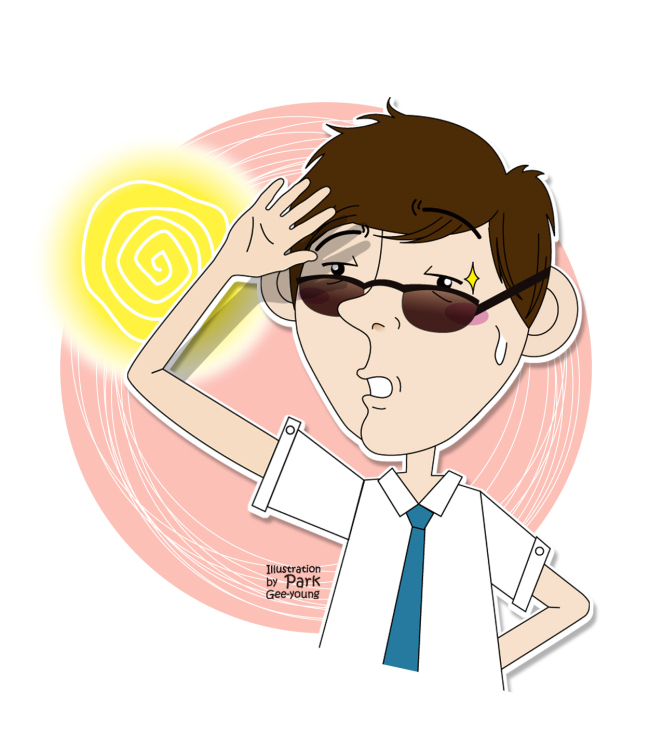Prolonged exposure of the eyes to UV light can cause acute or chronic damage. Acute damage occurs when there is excessive amount of UV exposure above a certain level in a short period of time, which can cause photo conjunctivitis or photo keratitis.
Photo keratitis produces a damaged epithelial layer of the cornea together with inflammation. The patient complains of photophobia, or intolerance to light, teary eyes and pain. Photo conjunctivitis causes symptoms such as red eyes and conjunctival edema.
 |
Illustration By Park Gee-young |
Chronic damage is caused by accumulation of prolonged exposure to UV light, and several epidemiological studies have reported the association with the development of glaucoma and pterygium. Although the association is not strong, it has also been reported that UV exposure is related to causes of blindness such as senile macular degeneration. However, the association is not as strong as that for glaucoma or pterygium. This is because with normal absorbance of light rays into the eyes, the UV light is also absorbed, which means that the level of UV light that reaches the retina is minimal. This may be thought of as a natural mechanism of defense.
Although it is difficult to accurately describe the various damage caused by UV light, several studies have shown that the light reaction causes direct damage, or produces reactive oxygen species from photochemical reactions, providing indirect evidence. It is thought that these mechanisms work together to produce damage.
Prevention of diseases that are caused by UV light involves avoiding prolonged exposure to sunlight on days expected to have a high level of UV light. If exposure is unavoidable, you should wear a wide-brimmed hat and sunglasses, UV-light-protected glasses or contact lenses.
For sunglasses, darker lenses do not correspond to the level of UV protection. This is because although darker colors transmit less sunlight, this causes pupil dilation, which can actually increase the absorbance of UV light. Therefore, a light-colored pair of sunglasses with UV coating is recommended.
The level of protection is best with larger lenses that fit closer to the eyes, and if possible, those that also cover the sides.
However, damage to the eyes due to UV light is very rare. Its association with the most serious condition, macular degeneration, is weak. Glaucoma and pterygium can be treated. Hence, preventative protection during outdoor activities from the sun will be sufficient. Those who have undergone corneal surgery, such as LASIK surgery, must be careful for a few months after the procedure.
By Chung Eui-sang
The author is a doctor in the Department of Ophthalmology of Samsung Medical
Center and a professor at Sungkyunkwan University School of Medicine. ― Ed.








![[Today’s K-pop] Blackpink’s Jennie, Lisa invited to Coachella as solo acts](http://res.heraldm.com/phpwas/restmb_idxmake.php?idx=644&simg=/content/image/2024/11/21/20241121050099_0.jpg)